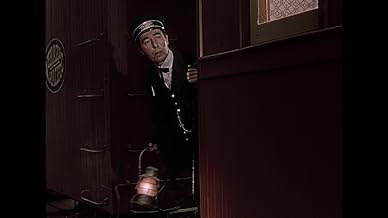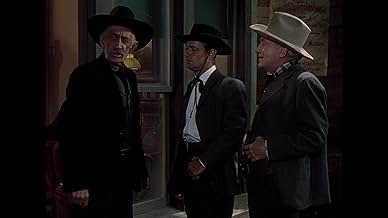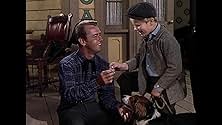AVALIAÇÃO DA IMDb
6,6/10
1,5 mil
SUA AVALIAÇÃO
Adicionar um enredo no seu idiomaLegendary railroad detective Whispering Smith becomes convinced that old friend and colleague Murray Sinclair has joined a criminal band to loot the railroad.Legendary railroad detective Whispering Smith becomes convinced that old friend and colleague Murray Sinclair has joined a criminal band to loot the railroad.Legendary railroad detective Whispering Smith becomes convinced that old friend and colleague Murray Sinclair has joined a criminal band to loot the railroad.
- Direção
- Roteiristas
- Artistas
- Prêmios
- 1 indicação no total
Ward Wood
- Leroy Barton
- (as Robert Wood)
Eddy Waller
- Conductor
- (as Eddy C. Waller)
- Direção
- Roteiristas
- Elenco e equipe completos
- Produção, bilheteria e muito mais no IMDbPro
Avaliações em destaque
Whispering Smith is directed by Leslie Fenton and co-adapted to screenplay by Frank Butler and Karl Kamb from Frank H. Spearman's novel. It stars Alan Ladd, Robert Preston, Brenda Marshall, Donald Crisp, William Demarest and Frank Faylen. Music is by Adolph Deutsch and cinematography by Ray Rennahan.
Famed railroad detective Whispering Smith (Ladd) becomes conflicted when his latest case pits him up against one of his best pals.
It's somewhat surprising to find Whispering Smith is not more well known, given that it's Ladd's first full length Western feature and that it's really rather good. With its opening scene of Ladd riding towards camera, with glorious landscape in the background, and the thematics of how Smith operates around women and children, this signposts towards Shane five years down the line. In fact this very much works as a tasty appetiser for that superb 1953 picture.
Ladd cuts a fine figure as Smith, giving him the right amount of calm toughness so as to not over play the role, and Preston is on fine form, very ebullient and able to act heaps with only his eyes. Marshall on the surface doesn't impact greatly, in what is a key role, but the character is very shrewdly written and sits in the story as more than a token. The villains headed by Crisp are not very inspiring, while Faylen looks laughably out of place with a blonde wig!, but with Preston erring on the side of badness the good versus bad axis of plotting thrives well enough.
Pic is filled with a number of shoot-outs, banditry and awesome locomotive action, all set to the backdrop of beautiful - Technicolor enhanced - California locales. The running theme of railroad progression in the West is interestingly written, managing to not take sides and let the viewer enjoy both sides of the coin, though a moral equation that Smith ultimately arrives at doesn't quite add up. Add in Fenton's unfussy direction, Rennahan's location photography (see also night sequences) and Deutsch's pleasingly compliant score, and Western fans are good to go.
This doesn't pull up any tress or have the psychological savvy of what many Oaters of the next decade would explore, but it's very well mounted and engages from the get go. 7/10
Famed railroad detective Whispering Smith (Ladd) becomes conflicted when his latest case pits him up against one of his best pals.
It's somewhat surprising to find Whispering Smith is not more well known, given that it's Ladd's first full length Western feature and that it's really rather good. With its opening scene of Ladd riding towards camera, with glorious landscape in the background, and the thematics of how Smith operates around women and children, this signposts towards Shane five years down the line. In fact this very much works as a tasty appetiser for that superb 1953 picture.
Ladd cuts a fine figure as Smith, giving him the right amount of calm toughness so as to not over play the role, and Preston is on fine form, very ebullient and able to act heaps with only his eyes. Marshall on the surface doesn't impact greatly, in what is a key role, but the character is very shrewdly written and sits in the story as more than a token. The villains headed by Crisp are not very inspiring, while Faylen looks laughably out of place with a blonde wig!, but with Preston erring on the side of badness the good versus bad axis of plotting thrives well enough.
Pic is filled with a number of shoot-outs, banditry and awesome locomotive action, all set to the backdrop of beautiful - Technicolor enhanced - California locales. The running theme of railroad progression in the West is interestingly written, managing to not take sides and let the viewer enjoy both sides of the coin, though a moral equation that Smith ultimately arrives at doesn't quite add up. Add in Fenton's unfussy direction, Rennahan's location photography (see also night sequences) and Deutsch's pleasingly compliant score, and Western fans are good to go.
This doesn't pull up any tress or have the psychological savvy of what many Oaters of the next decade would explore, but it's very well mounted and engages from the get go. 7/10
In "this gun's for hire" ,Robert Preston was Veronika Lake's co-star whereas Alan Ladd was supporting.But when you see that movie today you realize that ,although the credits mention "introducing A.L." ,his part was much more "written" ,more important than that of the lead.
In "whispering Smith" ,the roles are reversed:not only Ladd plays the lead ,but he has also the part of the good guy whereas Preston is supporting and gets the role of the villain.It's a routine western with a derivative screenplay:the umpteenth story of the pretty girl who married the wrong guy and see the other one come back into her life.The talents of the actor ,with many fine supporting performances (particularly Donald Crisp and Fay Holden who sings a duet with Ladd) make the movie watchable though.
In "whispering Smith" ,the roles are reversed:not only Ladd plays the lead ,but he has also the part of the good guy whereas Preston is supporting and gets the role of the villain.It's a routine western with a derivative screenplay:the umpteenth story of the pretty girl who married the wrong guy and see the other one come back into her life.The talents of the actor ,with many fine supporting performances (particularly Donald Crisp and Fay Holden who sings a duet with Ladd) make the movie watchable though.
Two railroad buddies drift apart when one decides to join a local gang.
Good "buddy" western. The soft-spoken Ladd and the voluble Preston play off one another really well. Their friendship appears touchingly real, unusual for movie make-believe. Then too, the movie has a lot of colorful aspects, especially the train wreckage scene that's both well-written and well-mounted, and like no other western set-up I've seen. There's also some great Sierra scenery along with a fine supporting cast. I especially like Frank Faylen's droopy-eyed gunman and Donald Crisp's friendly bad guy. And catch the lovely Brenda Marshall, unusually soulful for a western heroine. In fact, each of the supporting players manages a distinctive personality.
Certainly, no one could ever accuse Ladd of over-acting. He was always best when asserting a kind of quiet authority as he does here. Actually, that's an effective way to compete with Preston's naturally big personality. So, when the two have a showdown, it's almost like two complementary personalities tragically splitting apart. Something should also be said of the skillfully thought-out script that manages to mesh the complex plot into a believable whole. Anyway, in my book, it's a colorfully done, generally underrated oater from Hollywood's golden period.
Good "buddy" western. The soft-spoken Ladd and the voluble Preston play off one another really well. Their friendship appears touchingly real, unusual for movie make-believe. Then too, the movie has a lot of colorful aspects, especially the train wreckage scene that's both well-written and well-mounted, and like no other western set-up I've seen. There's also some great Sierra scenery along with a fine supporting cast. I especially like Frank Faylen's droopy-eyed gunman and Donald Crisp's friendly bad guy. And catch the lovely Brenda Marshall, unusually soulful for a western heroine. In fact, each of the supporting players manages a distinctive personality.
Certainly, no one could ever accuse Ladd of over-acting. He was always best when asserting a kind of quiet authority as he does here. Actually, that's an effective way to compete with Preston's naturally big personality. So, when the two have a showdown, it's almost like two complementary personalities tragically splitting apart. Something should also be said of the skillfully thought-out script that manages to mesh the complex plot into a believable whole. Anyway, in my book, it's a colorfully done, generally underrated oater from Hollywood's golden period.
Alan Ladd's first starring western and first film in technicolor is Whispering Smith. I have a funny feeling that someone at Paramount figured out that in boots with a couple of inches of heels on them, Mr. Ladd could get some additional height unnoticed. He certainly did do a lot of westerns after Whispering Smith.
According to the films of Alan Ladd and the biography by Beverly Linet, Ladd had purchased a ranch for his family and enjoyed his time out there and became an expert rider. For someone who arrived late to the western genre, Alan Ladd does sit the saddle well and looks right at home on the range.
The story based on a novel by Frank Spearman had been filmed two times previously as a silent film. Ladd is a railroad detective and we first meet him going after Murvyn Vye and his two outlaw brothers. Ladd's best friend is Robert Preston and his wife Brenda Marshall almost married Ladd back in the day.
Preston is a happy go lucky sort, but a lout none the less. The green eyed monster gets him though as Ladd is hanging around. Preston falls for the line that chief villain Donald Crisp gives him. Especially after he gets fired from the railroad after tangling with new superintendent John Eldredge. With his knowledge about the railroad, Preston becomes invaluable to Crisp.
Whispering Smith is directed by Leslie Fenton, former actor who was gradually getting into A films, but he retired after directing only a few more films after this one. The character he creates for Ladd is a harbinger of the one that George Stevens did for Ladd in Shane. I have no doubt that Stevens cast Ladd in Shane after viewing Whispering Smith.
And Whispering Smith probably would be considered a classic western if someone like George Stevens or John Ford or Anthony Mann had directed it. It's that good.
Donald Crisp is a garrulous, but crafty outlaw leader. William Demarest is fine in the sidekick role. But the portrayal among the supporting cast to watch is Frank Faylen's as the albino killer in Crisp's gang. I also think that George Stevens was influenced in his direction of Jack Palance in Shane from Faylen's portrayal. Faylen has even less dialog than Palance did in Shane, but he will absolutely chill you when you watch the film.
Whispering Smith is an absolute must for western fans and fans of Alan Ladd. It's a turning point film in his career and I'm glad it is finally out on DVD. Only wish a VHS version had been made of it.
According to the films of Alan Ladd and the biography by Beverly Linet, Ladd had purchased a ranch for his family and enjoyed his time out there and became an expert rider. For someone who arrived late to the western genre, Alan Ladd does sit the saddle well and looks right at home on the range.
The story based on a novel by Frank Spearman had been filmed two times previously as a silent film. Ladd is a railroad detective and we first meet him going after Murvyn Vye and his two outlaw brothers. Ladd's best friend is Robert Preston and his wife Brenda Marshall almost married Ladd back in the day.
Preston is a happy go lucky sort, but a lout none the less. The green eyed monster gets him though as Ladd is hanging around. Preston falls for the line that chief villain Donald Crisp gives him. Especially after he gets fired from the railroad after tangling with new superintendent John Eldredge. With his knowledge about the railroad, Preston becomes invaluable to Crisp.
Whispering Smith is directed by Leslie Fenton, former actor who was gradually getting into A films, but he retired after directing only a few more films after this one. The character he creates for Ladd is a harbinger of the one that George Stevens did for Ladd in Shane. I have no doubt that Stevens cast Ladd in Shane after viewing Whispering Smith.
And Whispering Smith probably would be considered a classic western if someone like George Stevens or John Ford or Anthony Mann had directed it. It's that good.
Donald Crisp is a garrulous, but crafty outlaw leader. William Demarest is fine in the sidekick role. But the portrayal among the supporting cast to watch is Frank Faylen's as the albino killer in Crisp's gang. I also think that George Stevens was influenced in his direction of Jack Palance in Shane from Faylen's portrayal. Faylen has even less dialog than Palance did in Shane, but he will absolutely chill you when you watch the film.
Whispering Smith is an absolute must for western fans and fans of Alan Ladd. It's a turning point film in his career and I'm glad it is finally out on DVD. Only wish a VHS version had been made of it.
This is one of my favorite movies because it has two of my favorite actors: Alan Ladd and Robert Preston.
These two were co-stars in other movies, but they are both used to their best in this one. Preston plays the friend gone bad and Ladd plays the honest cop who also loves his friend.
Actually, this plot is reminiscent of "The Virginian" which has always been so popular.
The vhs tape is very rare, so if you catch it on TV somewhere, TAPE IT!!
These two were co-stars in other movies, but they are both used to their best in this one. Preston plays the friend gone bad and Ladd plays the honest cop who also loves his friend.
Actually, this plot is reminiscent of "The Virginian" which has always been so popular.
The vhs tape is very rare, so if you catch it on TV somewhere, TAPE IT!!
Você sabia?
- CuriosidadesThe railhead town site was constructed on the Paramount lot adjacent to the neighboring RKO Pictures studio. It became the basis for what would go on to become Paramount's famous western town set as seen in TV's Bonanza (1959) and numerous other TV shows and movies. Prior to 1948, Paramount didn't have a western set on its studio lot. A short line of track was laid down that allowed a working period locomotive to pull into town.
- Erros de gravaçãoWhen Smith shoots his horse, the shadow of the dollying camera can be seen crossing his arm.
- Citações
Murray Sinclair: Guys like Smitty they don't make anymore!
- ConexõesEdited into Senda de Sangue (1954)
- Trilhas sonorasLaramie
Written by Jay Livingston and Ray Evans
Principais escolhas
Faça login para avaliar e ver a lista de recomendações personalizadas
- How long is Whispering Smith?Fornecido pela Alexa
Detalhes
- Tempo de duração
- 1 h 28 min(88 min)
- Proporção
- 1.37 : 1
Contribua para esta página
Sugerir uma alteração ou adicionar conteúdo ausente






















